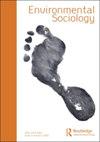‘Our wetland is our mother, you cannot take her away from us’: Reconstructing the political space of reclaiming a coastal wetland in Sompeta, Andhra Pradesh, India
IF 2.8
Q3 ENVIRONMENTAL STUDIES
引用次数: 1
Abstract
ABSTRACT The article is a case study of state-mediated wetland grabbing and dispossession and the people’s struggle to reclaim a coastal wetland at Sompeta in India. It examines the nature and mechanisms of dispossession as well as the resistance to wetland grabbing. The study shows that the apparatuses used by the state to capture the wetland, unleash a coercive process of land dispossession from above. It also uncovers a composite dispossessory politics, which is a convergence of the physical loss of wetland used as commons, loss of livelihoods and exclusion based on socio-cultural identities of gender, caste and class. Resistance from below counteracted both the coercive process and the dimensions of dispossession. We find that wetland commons is a geography of social embeddedness and ecological sustainability which has to be protected from commercial exploitation. Moreover, wetland conversion implies water scarcity and loss of social safety net for the disadvantaged communities dependent on the wetland. As long as the state continues to neglect this social reality, the rural communities will resist. To break the impasse, it is imperative to have ‘a dialogue’ among resource users with competing claims encompassing equity and sustainability.“我们的湿地是我们的母亲,你不能把她从我们身边夺走”:重建开垦印度安得拉邦桑佩塔沿海湿地的政治空间
摘要这篇文章是一篇关于印度Sompeta国家调解的湿地掠夺和剥夺以及人们为开垦沿海湿地而进行的斗争的案例研究。它考察了剥夺的性质和机制,以及对湿地掠夺的抵抗力。研究表明,国家用来捕获湿地的设备,从上方释放出一种强制性的土地征用过程。它还揭示了一种复合的剥夺政治,这是作为公地的湿地的物理损失、生计的损失和基于性别、种姓和阶级的社会文化身份的排斥的融合。来自下层的抵抗抵消了胁迫过程和剥夺财产的规模。我们发现,湿地公域是一个具有社会嵌入性和生态可持续性的地理区域,必须保护其免受商业开发。此外,湿地改造意味着缺水,依赖湿地的弱势社区失去了社会安全网。只要国家继续忽视这一社会现实,农村社区就会抵制。为了打破僵局,必须在资源使用者之间进行“对话”,提出包括公平和可持续性在内的相互竞争的主张。
本文章由计算机程序翻译,如有差异,请以英文原文为准。
求助全文
约1分钟内获得全文
求助全文
来源期刊

Environmental Sociology
ENVIRONMENTAL STUDIES-
CiteScore
4.60
自引率
12.00%
发文量
34
期刊介绍:
Environmental Sociology is dedicated to applying and advancing the sociological imagination in relation to a wide variety of environmental challenges, controversies and issues, at every level from the global to local, from ‘world culture’ to diverse local perspectives. As an international, peer-reviewed scholarly journal, Environmental Sociology aims to stretch the conceptual and theoretical boundaries of both environmental and mainstream sociology, to highlight the relevance of sociological research for environmental policy and management, to disseminate the results of sociological research, and to engage in productive dialogue and debate with other disciplines in the social, natural and ecological sciences. Contributions may utilize a variety of theoretical orientations including, but not restricted to: critical theory, cultural sociology, ecofeminism, ecological modernization, environmental justice, organizational sociology, political ecology, political economy, post-colonial studies, risk theory, social psychology, science and technology studies, globalization, world-systems analysis, and so on. Cross- and transdisciplinary contributions are welcome where they demonstrate a novel attempt to understand social-ecological relationships in a manner that engages with the core concerns of sociology in social relationships, institutions, practices and processes. All methodological approaches in the environmental social sciences – qualitative, quantitative, integrative, spatial, policy analysis, etc. – are welcomed. Environmental Sociology welcomes high-quality submissions from scholars around the world.
 求助内容:
求助内容: 应助结果提醒方式:
应助结果提醒方式:


